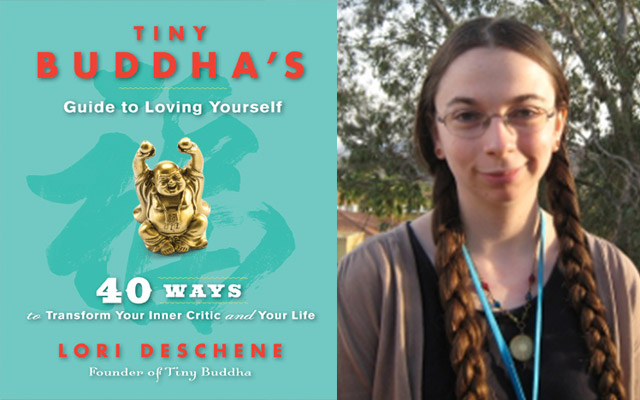
This month we’re celebrating the upcoming launch of Tiny Buddha’s Guide to Loving Yourself, a book about taming your inner critic that features 40 stories from Tiny Buddha contributors.
Throughout September, you’ll have a chance to meet some of them through daily interviews here on the blog.
Today’s featured contributor is life coach Joanna Z. Weston, who formerly struggled with depression and now helps others find a way out.
Her contribution for the book urges us to celebrate how far we’ve come in life instead of focusing on everything we think we lack or should have done by now.
A little more about Joanna…
1. Tell us a little about yourself and your self-love journey.
I’ve struggled with depression, shyness, and general insecurity most of my life, so self-love has never come easily for me. I doubt that it ever will come very easily, which is why I am so well-suited to helping other people learn to do it; I know just how hard it is to practice self-love, so I will never take it for granted!
2. Have you ever felt there’s “something wrong with you”? If so, why, and what’s helped you change your perception?
Something? Try everything! I have hated (in no particular order): my body, my sense of humor, the talents I have, the fact that I lack the talents I lack, my strong opinions, and my general world view (because it was different from my peers).
Not so coincidentally, those are the exact same reasons why my friends and husband claim to like me so much. Go figure!
3. Have you ever thought something was a flaw only to realize that other people actually appreciate that about you? What was the “flaw”?
I’ve spent most of my life feeling not like a square peg in a round hole, but more like a non-Euclidean peg in a round hole. It’s not anything specific I can really point to. My whole way of looking at the world is just 15 degrees off from center.
I do very odd things with words. I get way too excited about things that most people just do not care about, and am bored by the things that other people find fascinating.
I’m too weird for normal people, but don’t fit in any better with the geeks and the other freaks, because I suck at conforming to their standards almost as much as I suck at conforming to the normal ones!
But apparently this is what my friends like about me. It’s hard to let go, but the people who don’t appreciate it don’t matter. Not really.
4. What was your biggest mistake (that you’re willing to share), and what helped you forgive yourself?
I had a serious interpersonal kerfluffle during college, and I spent years and years dwelling on it. What finally let me move on was a combination of a lot of things, but mostly realizing that, when it was happening, there was really nothing else I could have done, given who I was and where I was in my life.
There were better ways of handling it, but I didn’t have access to them. Time also helped; it may not completely heal all wounds, but it does allow scabs to form if you can avoid picking them off.
5. Complete this sentence: When other people don’t like me, I…
…used to either desperately try to make them change their minds, or else become defensive and bitter. Now I try to take a deep breathe and remember that their opinions are their business, and have little to do with me.
6. What are some areas in your life where you’ve compared yourself to other people, and what’s helped you let go of these comparisons?
The only thing I’ve found that helps me to stop comparing myself (negatively, of course) to everyone else is to love myself better. To honor my true strengths, rather than downplaying them as “easy” or “not important.”
It has been really, really hard for me to learn that the things I excel at are valuable, and also that I don’t have to be good (or even competent) at everything. There is something to be said for improving your weak areas, but there is also a lot to be said for focusing on and honing your strengths.
Something else that has been helpful is surrounding myself with people who don’t feel a need to put me down in order to elevate themselves. It isn’t necessary and it isn’t healthy, for me or for them.
7. What’s one thing you would tell your younger self about looking to other people to complete you?
It’s a lovely idea, but it won’t work. You cannot truly accept anything from someone else that you can’t give to yourself, at least in some small way. That is true for love, forgiveness, acclaim, pride, and pretty much everything else worth feeling or having.
It’s not that other people can’t give you those things in part—they can and they do and they will!—but you won’t be able to feel the truth of their gifts until you can offer the same things up to yourself.
Oh, and don’t beat yourself up if you have trouble putting that into practice—nobody really has that one down perfectly.
8. Have you ever felt afraid to show people your “real” self? Why—and what’s helped you move beyond that?
I’m actually terrible at keeping my real self hidden, though I’ve often wished it were otherwise—it would make my life a hell of a lot easier! But in reality, I think that has been a great blessing for me.
If I were better able to hide my true self to fit in, I might never have worked up the courage to let it out. As it is, I struggled a lot in social situations (particularly in elementary school), but I eventually learned how to avoid the people who didn’t understand me and surround myself with supportive friends.
9. What are the top three things you personally need to do to take good of yourself, mentally and emotionally?
I absolutely must spend time every day in some sort of spiritual communion—prayer, meditation, and gratitude are essential. Getting enough sleep (no less than 7 hours, ideally 8 or 9) is also critical, as is eating properly (which can vary from day to day, but definitely involves getting enough protein and eating frequently).
And to be honest, a lot of that changes based on circumstances. I’m ordinarily solitary, so sometimes taking care of myself means forgoing a good night’s sleep in order to stay up late with friends. But if I’m living in any sort of communal setting (even for a day or two), it is absolutely vital that I have some time away from other people.
For me, it’s important to respect irrefutable truths about who I am, but also to stay flexible and responsive.
10. What’s something you do regularly that makes you feel proud of the difference you’re making in the world?
My coaching. I truly believe that helping more people to genuinely know and love themselves, to honor their strengths and bring their potential to life, is the most important thing I can be doing.
The world needs more people who are motivated by joy and fewer people who are motivating themselves through bitterness, hatred, and fear. Those do not motivate people to live with compassion, and that is what this world really needs.
There is a myth that happiness causes complacency, but that’s just a story we tell ourselves to justify our misery. If you are truly happy, if you truly love yourself, if your cup truly runneth over, then you will naturally want to help other people.
Suddenly, it’s no longer hard to loan a friend money, or watch someone’s kids for the afternoon, or make the effort to shop at local stores, or throw out your trash instead of tossing it on the ground. If I can help bring more of that energy into the world, then I’m doing pretty damn well.
*Note: I edited this post to remove info about the pre-order promotion, which ended on October 8, 2013. You can learn more about Tiny Buddha’s Guide to Loving Yourself here.
About Lori Deschene
Lori Deschene is the founder of Tiny Buddha. She started the site after struggling with depression, bulimia, c-PTSD, and toxic shame so she could recycle her former pain into something useful and inspire others to do the same. You can find her books, including Tiny Buddha’s Gratitude Journal and Tiny Buddha’s Worry Journal, here and learn more about her eCourse, Recreate Your Life Story, if you’re ready to transform your life and become the person you want to be.
- Web |
- More Posts













 Though I run this site, it is not mine. It's ours. It's not about me. It's about us. Your stories and your wisdom are just as meaningful as mine.
Though I run this site, it is not mine. It's ours. It's not about me. It's about us. Your stories and your wisdom are just as meaningful as mine.